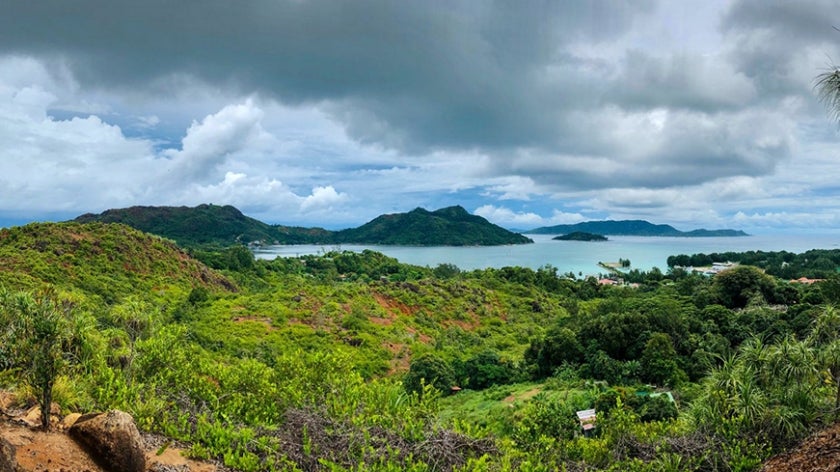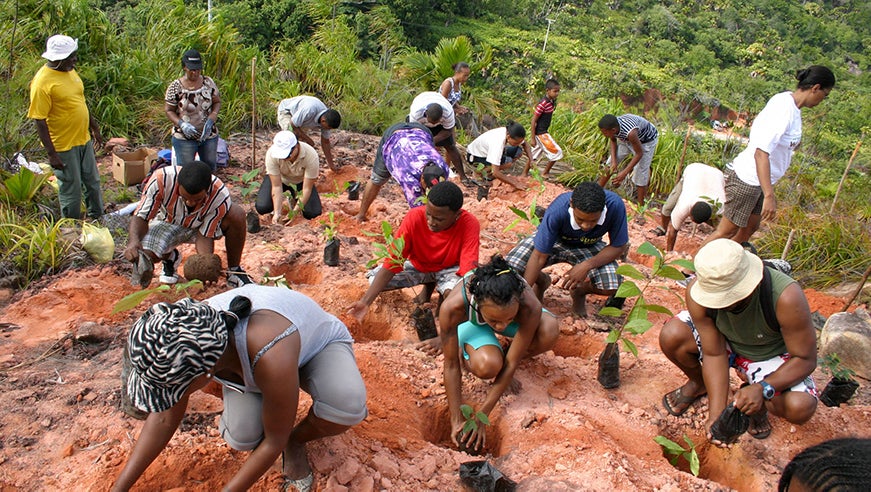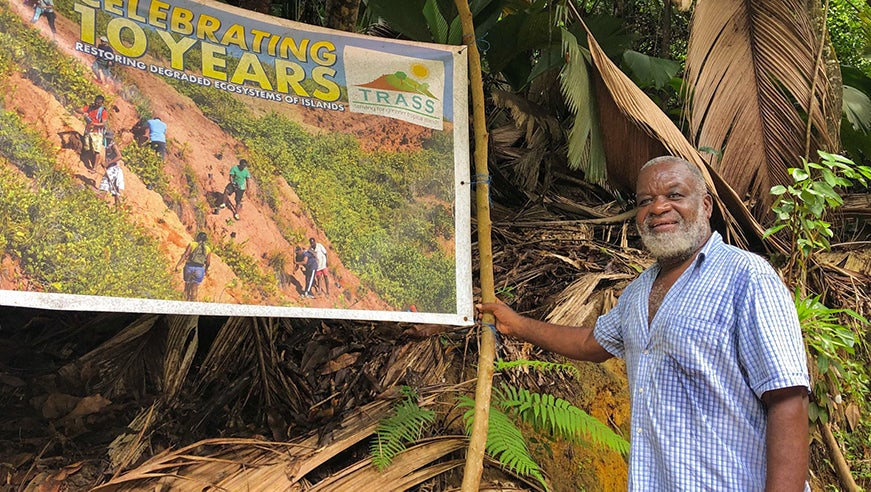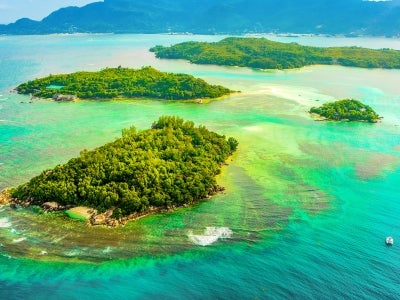
"Protecting nature makes me very happy in life," says Victorin Laboudallon. "We need to protect it as much as we can, so future generations can enjoy it like I did when I was a kid."
Victorin Laboudallon, frequently considered the 'Father of Seychelles Conservation,' established the Terrestrial Restoration Action Society of Seychelles (TRASS) in 2010.
Laboudallon, 65, has built a network of volunteers, from children to retirees, whom he calls upon to help him with replanting. Together with over 3,000 volunteers, he leads TRASS’s rehabilitation efforts replanting over 15,000 trees every year.
Laboudallon embodies the sentiment that a society grows great when old men plant trees whose shade they know they shall never sit in.
No man is an island entire of itself; every man is a piece of the continent, a part of the main...
The Seychelles is an archipelago of 115 coralline and granitic islands located in the Indian Ocean, and is often associated with exotic beaches, turquoise waters, rich coral reefs, and lush tropical forests. In the minds of many, it is an isolated paradise and the perfect escape from quotidian concerns.
This picture-postcard view is common for many Small Island Developing States, however climate change presents a very different reality for these vulnerable island nations.
SIDS often experience acceleration or intensification of climate change impacts due to their small land areas, susceptibility to natural disasters, geographical isolation, limited natural resources, and sensitive ecosystems.
These variations in climate not only affect the environment and resilience of natural ecosystems, but also have ripple effects on every sector of the economy and society including economic stability, agriculture and food security, water access and sanitation, health and well-being, tourism, and livelihoods.
In Seychelles, rainfall variability, drought, flooding, coral bleaching, sea level rise, and coastal erosion represent the earliest effects of climate change.
Bolstering climate action
Recognizing these challenges, the GEF Small Grants Programme (SGP), implemented by the UN Development Programme (UNDP), supported three climate change adaptation projects in Seycelles’ Praslin Island as part of the Community-based Adaptation Program (CBA) supported by the Government of Australia’s Department of Foreign Affairs and Trade.
The CBA program supports 42 countries, particularly SIDS and least-developed countries, in their efforts to adapt to the changing climate.
For these three projects on Praslin, the SGP aligned its approach to the Seychelles National Climate Change Stategy and designed the projects in a participatory manner with key inputs from local non-governmental organizations and communities, private sector and local businesses, state agencies, and local authorities. The aim of these interventions has been to reduce the vulnerability and increase the adaptive capacity of the coastal and farming communities located on the island.
"The task to make Praslin greener is one that TRASS started but it will take several generations to achieve. What is of great importance is the process of achieving this success by empowering people to make a difference in their lives where it matters. When TRASS started there were only a few of us, today TRASS is the biggest volunteer group in the Seychelles and together we will make a difference." - Dr. Elvina Henriette, Conservation Biologist, TRASS Conservation Manager

Climate action on an island paradise
The impacts of climate change and environmental degradation are increasingly evident on Praslin Island.
Every year more of the coastline is being lost to erosion and sea level rise; farmers suffer from droughts, floods, and salt water intrusion, which leads to reduced crop yields and livelihood challenges; and the mountain landscape bears evidence of degradation due to anthropogenic and natural forest fires intensified by long droughts.
"Although Praslin has beautiful views, I did not realise how degraded the mountains on Praslin were. This project has enlightened me on the issues being faced by Praslin and now I feel proud to contribute to make it greener." - Ms. Nadine Jack, SEYPEC representative, member of the replanting team
To address these issues, SGP partnered with the TRASS on Praslin Island.
Over 2,000 seedlings were produced in the TRASS nursery for the project. This involved collecting and propagating native seedlings and plant cuttings from other forested areas on the island. This nursery is one of the largest in the Seychelles, and the only one located on Praslin.
From the ashes
Fires are the main threat to the unique forest ecosystems on Praslin, and the long and harsh drought periods intensified by climate change increase the risks of their occurrence, as well as their intensity once alight.
Praslin’s La Hauteur watershed in the Midland region suffered from 12 recorded human-induced forest fires between 1996 and 2008. Over the years, the exposed burnt land suffered degradation affecting over 30 hectares of ground, leading to consequences for downstream communities.
The direct relationship between forest fires, forest degradation, reduced tree cover, and impacts on the water cycle (e.g. reduced river flows) has already impacted the livelihoods of farmers downhill.
Wherever there’s a forest fire in the Seychelles, you can be sure you’ll find Laboudallon ready to fight back, armed with seeds and shovels: "If tomorrow we have another fire, we are ready to go back and plant."

A future forest; a rehabilitated watershed
With these challenges in mind, TRASS focused on the development of a Rehabilitation and Management Plan for the La Hauteur watershed as well as on soil amendments, planting techniques, irrigation, and seedling production.
La Hauteur is one of the priority areas for TRASS rehabilitation, primarily because it is above one of the largest farming communities on Praslin and its residential and commercial areas. La Hauteur is also the source of both Rivière La Hauteur and Côte d'Or River, which provide water to the farming communities downstream but which have experienced reductions in water flow and volume.
To develop the Rehabilitation and Management Plan, and with the additional support of an Australian Aid grant, TRASS conducted baseline assessments of the watershed to obtain information on the ecological status of the area, and to map the extent of degradation.
Soil samples were also collected and analysed by the Seychelles Agriculture Agency, which revealed the soils were acidic and required improvement to facilitate optimum plant growth. This baseline information collected was important for TRASS to determine ways to improve the soil prior to replanting, and key to guide the development of a cohesive rehabilitation strategy.
TRASS members collected several hundred bags of natural compost, which was then mixed with the red loam soils present on the watershed. Organic fertilisers such as chicken manure were also added to increase the nutrient content, and calcium carbonate was added to balance the soils’ pH.
"Through the project, I not only learned plant propagation techniques, I was also able to improve my livelihood and household income by earning additional income from plant preparation." - Mr. Jimmy Vidot, TRASS volunteer
Sewing seeds yields results
As a result of these efforts, two hectares of degraded land were replanted with 2,322 plants, and 17 hectares are under additional rehabilitation. Over 20 volunteer organizations and 1,300 community members have benefitted from both projects to date.
The community has also increased its resilience and ability to adapt to climate change. A core group of 12 individuals, in addition to a peripheral group of 20, were trained to transfer knowledge and know-how to the wider community.
Through training and upskilling initiatives, local community capacity was enhanced to ensure that they continue towards the end goal of developing, implementing, and sustaining their own solutions to current problems.
Having trained, knowledgeable personnel is vital for the success of the TRASS rehabilitation program and ensures long-term sustainability and community ownership.
A plant database
This initial support by SGP has contributed to the development of a plant database with additional co-financing from the Adaptation Fund. TRASS members and project participants were also trained in data entry, use, and management.
The UNDP-supported, Adaptation Fund-financed project, Ecosystem-Based Adaptation to Climate Change in Seychelles, is leveraging TRASS’s institutional knowledge and building on these efforts to rehabilitate degraded water catchments.
From the mountains to the sea, replicating success
Given the success of these initiatives, the rehabilitation initiative has also been scaled up under the GEF–financed Ridge to Reef Project, which aims to enhance conservation of forest, coastal, and marine ecosystems on the islands of Mahe, Praslin, and Curieuse.
In particular, TRASS is one of the key stakeholders of the project and is responsible for the implementation of the rehabilitation activities.
The GEF Ridge to Reef project takes place in various locations, but efforts on Praslin are building on the full complement of experiences that TRASS has accumulated via its initiatives, be they volunteering, propagation and planting techniques, plant identification, and project management.
Dr. Elvina Henriette, Conservation Biologist and TRASS Conservation Manager, commented on the Ridge to Reef Project in the Seychelles: "This project is crucial, as there is connectivity between mountains, rivers and the coast. All that happens at the top has a direct impact on what happens at the bottom. You cannot have a program that looks only at one side, we must consider a landscape approach so that whatever is done at the mountains will have a positive impact on the reef."
Further work
Trials done under the SGP and other projects (e.g. testing the performance of plant species to identify which species adapts and performs best in degraded conditions), have generated positive results; the lessons learnt are now being used in other projects. TRASS now knows which species to focus on to have better success in rehabilitation programming. Initial results from trials can then be scaled up throughout the Seychelles and in other SIDS.
Building on these efforts, additional projects are taking climate action - and generating further funding and partnership opportunities – including with organisations such as UNEP, UNDP, the Adaptation Fund, and the Seychelles Government. The R&M plan, the plant database, and the enhanced capacity of TRASS have all made significant contributions to these sustainable interventions.
Small grants = big impacts
Since 2008, the SGP, implemented by UNDP in Seychelles has supported 58 projects working to protect biodiversity, address climate change, and prevent land degradation.
By providing financial and technical support to projects that conserve the global environment while enhancing people's well-being and livelihoods, SGP demonstrates that through a mix of motivation, creativity, technology, and knowledge, we can find concrete solutions to some of our most pressing social and environmental challenges.
This piece was originally posted by the GEF Small Grants Programme. Photo credits: Rissa Edoo/UNDP Seychelles, SGP Seychelles, the Terrestrial Restoration Action Society of Seychelles and additional photos courtesy of the IWRM AIO SIDS project in the Seychelles.


